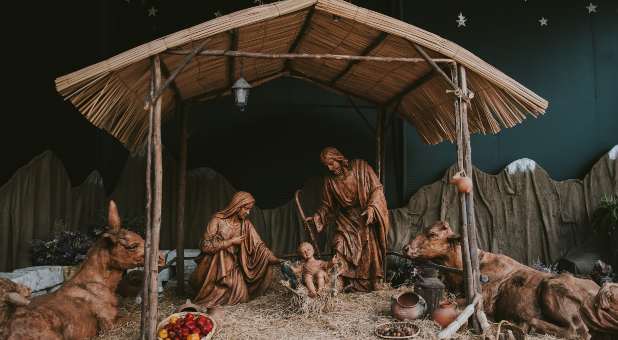In our neighborhood, there is a home where, among the festive lights and exterior decorations of this season, there is a banner that merely says “JESUS. Celebrate the Reason!”
Happily, other homes have some exterior decorations that show the nativity scene or other obvious biblical reminders of the events of the first Christmas—the coming of the Christ child!
At the same time, a few homes in our neighborhood have replicas of Jewish menorahs, spinning dreidels and the Star of David, displayed under blue-and-white lights as reminders of the Jewish Festival of Lights, or Hanukkah. It is also celebrated during this early winter season and was observed by Jesus (Yeshua) as the Feast of Dedication (John 10:22-39).
Religious Displays in a Civil Democracy
Even among those of other faiths or some who may have rejected Christ or have no practiced religious faith at all, Christmas often holds fond memories and family traditions rooted in the gospel story. All faith groups may culturally enjoy viewing constitutionally permitted displays of the nativity—even on public properties at Christmastime.
Courts have correctly ruled that, in our constitutional democracy, religious displays may be made on public property, as long as they are “inclusive” and allow other displays from any and all religious faiths that may desire to do so.
In that context, a different form of public display inside the Iowa state Capitol building has made headlines in recent days. A local satanic temple placed a grotesque statue and altar to a pagan idol along with other satanic decorations on the ground floor in the building’s rotunda, near the Capitol’s annual nativity scene.
While many in that socially conservative state called it “absolutely objectionable” and asked for prayer over the building, Republican Rep. Jon Dunwell pointed out, “I don’t want the state evaluating and making determinations about religions.”
Religious Syncretism
The fusion or “blending of religious belief systems into a new system, or the incorporation of other beliefs into an existing religious tradition” is called religious syncretism (Wikipedia).
The apostle Paul encountered this phenomenon in Athens at a place for debate called the Areopagus or Mars Hill (Acts 17:16-34). Athens was the religious center of the cultured Greco-Roman world of that time. It has been said “there were more statues of gods in Athens than in all the rest of Greece put together.” In spite of their religious syncretism, the Athenians were ignorant of the true God. Paul stood up among the superstitious philosophers and said:
“Men of Athens, I notice that you are very religious, for as I was out walking I saw your many altars, and one of them had this inscription on it—‘To the Unknown God.’ You have been worshiping Him without knowing who He is, and now I wish to tell you about Him.
“He made the world and everything in it, and since He is Lord of heaven and earth, He doesn’t live in man-made temples; and human hands can’t minister to His needs—for he has no needs! He Himself gives life and breath to everything, and satisfies every need there is” (Acts 17:22-25, TLB).
Later, Paul told the Roman believers to behave in ways that match our beliefs. One Christian worldview radio ministry has summarized guidelines for our Christlike living down to this slogan: “Think biblically and live accordingly.”
Disagree Agreeably
In Chapter 12 of the epistle to the Romans, Paul taught that love is to be our guiding principle in our relationships with fellow believers (vv. 9-13) but also with those who may persecute us as enemies (vv. 14-21).
Sign up NOW for a FREE Charisma Magazine Online 30-day trial!
In verse 18, he admonished us not to “quarrel with anyone” but to “be at peace with everyone, just as much as possible.” To the degree it depends on us, we should seek peace with others and in all circumstances. If disagreement must happen, let it be agreeable and peaceable. Try not to burn bridges with other believers. Make sure if all efforts toward peace fail, it is not our fault.
The apostle goes on in verse 19 to say we should “never avenge yourselves. Leave that to God, for he has said that he will repay those who deserve it.” In other words, don’t take the law into your own hands. Instead, give the issue over into God’s hands. He will exact vengeance at the final judgment or even in this life–sometimes through civil government, which He has instituted and whose authorities are His accountable servants for our good (13:1-4).
‘O, Holy Night‘
As we approach these final days of celebrating the reason for this annual season, I’ve been taken by the relevance of the third verse of the classic Christmas hymn, “O Holy Night.” Third verses are often unfamiliar lines, and these thoughts may be new to many of us:
Truly He taught us to love one another/His law is love and His gospel is peace/
Chains shall He break, for the slave is our brother/ And in His name all oppression shall cease.
Sweet hymns of joy in grateful chorus raise we/ Let all within us praise His holy name.
Christ is the Lord! O praise His name forever/His power and glory evermore proclaim!
His power and glory evermore proclaim!
(“O Holy Night,” John S. Dwight)
Merry Christmas!
Join Charisma Magazine Online to follow everything the Holy Spirit is doing around the world!
Licensed to full-time ministry in 1967, Gary Curtis has served on pastoral staffs and in administrative roles at churches in Illinois and California, including 27 years at The Church on The Way, the First Foursquare Church of Van Nuys, California. Now retired, Gary continues to write a weekly teaching blog and frequently contributes ministry-related articles for digital and print platforms.














































